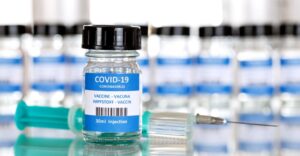5 Questions Fauci and FDA Need to Answer on Pfizer and Moderna COVID Vaccines
Covid19 Virus Vaccines Time Travel
 As reports surfaced today of yet another healthcare worker who suffered a severe allergic reaction to Pfizer’s COVID vaccine, it’s time the FDA and Fauci explain what they plan to do about it.
As reports surfaced today of yet another healthcare worker who suffered a severe allergic reaction to Pfizer’s COVID vaccine, it’s time the FDA and Fauci explain what they plan to do about it.
Another day, another story about a healthcare worker suffering a “severe allergic reaction” after receiving Pfizer’s COVID vaccine — this time, in New York. The report follows the news Children’s Health Defense (CHD) has been covering about similar severe reactions, first in the UK, then in Alaska and Illinois.
In light of these events, and because CHD previously warned the U.S. Food and Drug Administration (FDA) officials and Dr. Anthony Fauci, director of the National Institute for Allergy and Infectious Diseases (NIAID), about the potential for the Pfizer and Moderna vaccines to cause anaphylactic reactions, we have some questions we’d like Fauci and the FDA to answer.
They are:
1. Why didn’t the FDA’s Center for Biological Evaluation and Research require Moderna and Pfizer-BioNTech to conduct immunogenicity testing on their COVID-19 vaccines for anti-drug antibodies as recommended in the agencies’ own guidelines for drug development during clinical trials?
In January 2019, the U.S. Department of Health and Human Services, FDA, Center for Drug Evaluation and Research, and Center for Biologics Evaluation and Research issued a document, “Immunogenicity Testing of Therapeutic Protein Products — Developing and Validating Assays for Anti-Drug Antibody (ADA) Detection: Guidance for Industry.”
The document, described as providing “recommendations to facilitate industry’s development and validation of essays for the assessment of the immunogenicity of therapeutic protein products during clinical trials,” clearly acknowledges the existence of anti-drug antibodies, such as polyethylene glycol (PEG), in humans. The document states:
- Immune responses to therapeutic protein products have the potential to affect product pharmacokinetics, pharmacodynamics, safety and efficacy.
- The clinical effects of immune responses in subjects are highly variable, ranging from no measurable effect to extremely harmful.
- Detection and analysis of ADA formation is a helpful tool in understanding potential immune responses.
- Information on immune responses observed during clinical trials, particularly the incidence of ADA induction or any implications of ADA responses affecting pharmacokinetics, pharmacodynamics, safet, or efficacy is crucial for any therapeutic protein product development program.
- Accordingly, such information, if applicable, should be included in the prescribing information as a subsection of the ADVERSE REACTIONS section entitled Immunogenicity.
However, despite the FDA’s own guidance recommending that information about immunogenicity be included on the vaccine package inserts, no such information is included on either the Pfizer-BioNTech or Moderna COVID-19 vaccine inserts.
Page six of the FDA document cites research that specifically addresses the need to “adequately understand the risk of anti-drug antibodies … in products with modifications such as pegylation.” But without that information provided on package inserts, vaccine recipients can’t understand those risks.
The rapidly developed and currently distributed mRNA vaccines rely on a new nanoparticle-based “carrier system” that utilizes PEG. The lipid nanoparticles (LNPs) carrier system used in the two COVID-19 vaccines to facilitate the delivery of the mRNA into the cell is pegylated — which means, coated with PEG. Coating the lipid nanoparticle with PEG keeps it from degrading.
An article published this year in Advanced Drug Delivery Reviews reported:
“Conjugation of polyethylene glycols (PEGs) to proteins or drug delivery nanosystems is a widely accepted method to increase the therapeutic index of complex nano-biopharmaceuticals. Nevertheless, these drugs and agents are often immunogenic, triggering the rise of anti-drug antibodies (ADAs). Among these ADAs, anti-PEG IgG and IgM were shown to account for efficacy loss due to accelerated blood clearance of the drug (ABC phenomenon) and hypersensitivity reactions (HSRs) entailing severe allergic symptoms with occasionally fatal anaphylaxis.”
5 Questions Fauci and FDA Need to Answer on Pfizer and Moderna COVID Vaccines
-
We will never stop fighting for you.
From the newsroom to advocacy at the state and federal level; from the courtroom to the streets, we will never stop fighting for you — and in this heightening crisis, for democracy itself.
Thank you for helping Children’s Health Defense stand up to the corruption, malfeasance and failure of government to put the interests of children before industry.
We are grateful to you for standing on the front lines with us, and know that together we can change lives and protect children.
Happy Holidays from Robert F. Kennedy, Jr. and the Children’s Health Defense Team
P.S. Thanks to a generous anonymous donor, every dollar you donate before Dec. 30 will be matched up to $25,000.
Link for our one-time donation form. You can also make a recurring donation.





